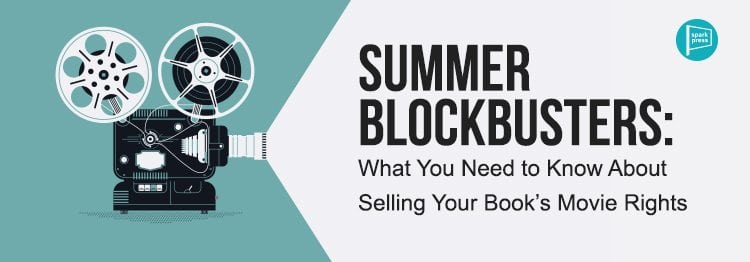
Every author wants their book to become a movie, but getting a story from print to screen can be complicated and more than a little daunting. What does it mean for someone to “option” your story? How much money is your book worth? Do you need an agent? What rights can the author expect to keep?
So if you’ve ever been curious about the ins and outs of getting a movie deal, look no further! We’re here to shed some light (a spotlight, even) on just how it is a book becomes a film.
Agents
If you can afford one, an agent will make most of this process proceed far simpler. If you can’t afford one, you’re going to need to be familiar with contracts or fluent in legalese—or have a friend or family member who’s willing to help you out.
Contracts
This is where having an agent starts to come in handy. Agents are trained to take care of contracts and the like on your behalf so you can rest easy. There are several points where contracts are going to be written and negotiated; in fact, most steps of the process involve a contract in some way, and most of the contractual dealings are taken care of right from the beginning when the book is optioned.
Optioning
Before a producer decides to go through with making the film (or mini-series or TV show), they will buy the exclusive right to buy the right to your book. Put more simply, if they’ve optioned it, they get time (generally about 6-18 months) to figure out whether the film is viable for them. At the end of that period, they can drop the project, purchase it, or ask for more time to look into it. Generally, they will pay for the right to consider the book and that price will be removed from the final purchase price—renewals are not generally removed. The price they pay at this point and later depends largely on the book’s popularity or the author’s popularity. As such, this price varies widely depending on the book, the genre, the audience . . . you get the idea!
Purchasing
This is pretty straightforward at first glance. This is the point where rights are transferred in exchange for money. The first price paid for optioning will generally be subtracted from the final purchase price. That price itself, again, varies widely. Generally, it’s based on a percentage of the total budget for the film with an upper and lower limit. So, for example, a purchase price could be negotiated to be no less than $75,000 and no more than $250,000; this ensures that the filmmaker’s budget doesn’t bust and that the author gets a guarantee of reasonable payment.
Rights and Restrictions
Now we get to the tricky part. This is also where consulting with an agent (or hiring one) is really going to streamline things, but there’s a lot of information online about which rights mean what. For example, reserving the right to continue writing in your own universe, but also potentially allowing for the producers to make spin-offs or sequels based on the movie they make. They also need the ownership rights to “development materials” in order for them to, well, develop the so-called “audio-visual project.” There is a long list of rights (including merchandising, advertising, etc.) that will need to be included in any contract, but a full list would be enough to fill an article on its own.
Reserved Rights
These ensure that the original author is still able to use their own materials; not something you’d think would be an issue, but contracts need to be very specific about everything. You don’t want to be unable to work with your materials simply because you forgot to say that you’d be allowed to. This includes the right to create “author-written” sequels to the book, radio rights, the right to create print publications (like graphic novels), live-stage rights, etc. These might seem minor, but they’re important to think about and include in your contracts.
Reversion
This means that after a certain agreed upon period of time (generally 5-7 years), if a movie or adaptation has yet to be made, the rights revert back to the author so that they can continue looking for someone to pick it up. Refunds will need to be negotiated and renewal processes established, but this serves as incentive for the studio to finish and a safety net for the author.
Credit and compensation
Credit will generally consist of the author’s name being attached to the film, like: So-and-So’s Blockbuster Movie, or Blockbuster Movie based on So-and-So’s Awesome Book. Anything else will probably have to be negotiated. Compensation is usually based on a percentage of the film’s total budget, but is entirely up to negotiation, as mentioned above. Royalties will also need to be negotiated and also tend to come out as a percentage of total income.
Consultation, approval, and participation
After the rights have been signed over, unless you’re a Big Name, you’re probably not going to get much say in how the movie turns out. Some directors will let an author consult with casting or the adaptation process itself, but don’t count on it. Once the book has been signed over, it’s out of your hands.

VERY HELPFUL INDEED!